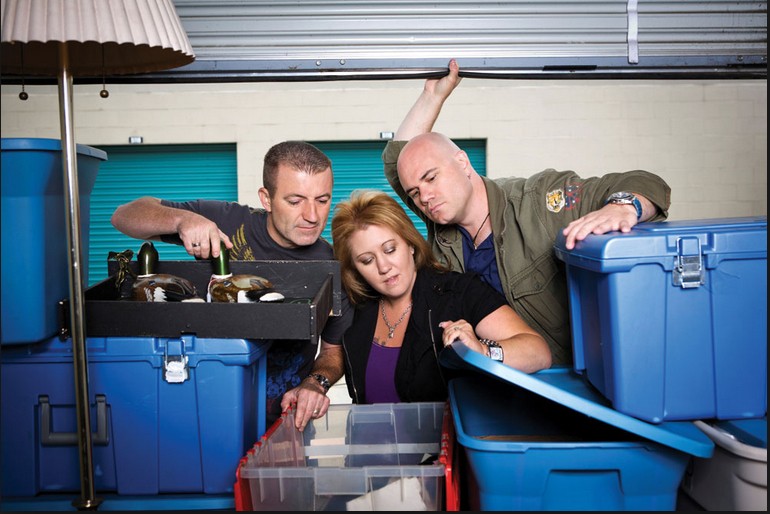TV shows like Storage Hunters and Storage Wars are popularising the idea that you can make big money from buying at this type of auction.
Storage auctions in the UK are starting to surface more every week. These auctions are the sale of the contents of storage units, containers or lockers. They are usally held online or at the storage facility site. There are around 1200 storage facilities across the United Kingdom all of which might hold storage auctions.
Storage auctions in the UK are a bit different so you’ll need to know a few facts before committing time and money.
Storage auctions
In the UK these type of auctions offer buyers a chance to make money when payment is not made. Most storage facilities are only too pleased to open their doors to the public in the hope that the auction will generate more funds to offset the debt.
Bidding
A storage auction in this country is normally carried out by the owner of the units. When a locker is ready for sale most storage firms have a list of potential buyers who are always on the lookout for a new container. The bids are conducted by email and phone and then the winner comes to site and has to clear the whole unit.
Great bargains
Sometimes there are some real finds in the unit but it is very much pot luck as you bid blind. Getting a storage locker for a percentage of its price has to be a great feeling and it makes a lot of business sense but it can go awfully wrong if the container has nothing of value.
Auction houses and Live Auctions
If you’re interested in becoming involved with this type of auction get in touch with your local storage facilities who will put you on their list and contact you when one becomes available. Some storage auctions in the UK also offer the contents of the locker to local auction houses. Buying at an auction house could mean a lower investment because they often split the lots up and you can see what you are bidding on. It is possible t furnish your entire house or stock up your Second-hand Shop. Maybe you just want to find those hidden treasures that someone may have stored in their storage unit.
What can be found in a Storage Auction
You will find all sorts of items at these auctions. From Household Furniture, Antiques and Collectables, Tools, and even Cars, boats. Most items you find in a storage locker do hold some value and can be reused or sold.
Storage auctions in the UK have gained popularity in recent years, thanks to their thrilling and potentially lucrative nature. If you’re curious about how these auctions work, here’s an overview of the process:
- Storage Facilities: Storage auctions take place at self-storage facilities where individuals rent storage units to store their belongings. When tenants fail to pay their rent for a specified period, typically three months, the storage facility takes ownership of the contents within the unit.
- Auction Announcement: Storage facilities are legally required to provide notice to the tenant before auctioning off their unit’s contents. The notice is usually sent via registered mail or email, informing the tenant of the outstanding balance, auction date, and location.
- Auction Date and Location: The storage auction is held at the storage facility or a designated auction house. The date, time, and location of the auction are typically advertised in local newspapers, online auction websites, and through auctioneers who specialize in storage auctions.
- Viewing Period: Prior to the auction, prospective bidders are given a viewing period during which they can inspect the units from the outside. They cannot enter or touch the items within the units. This allows bidders to assess the potential value and condition of the contents.
- Auction Process: On the day of the auction, registered bidders gather at the specified location. The auctioneer explains the rules and procedures, emphasizing that all items are sold “as is” and without warranty. Bidders are provided with a number or paddle to bid on units.
- Unit Auction: The auctioneer opens the bidding for each storage unit one at a time. Bidders can observe the contents from the doorway but are not allowed to enter or touch anything. The bidding starts at a certain amount, and interested bidders raise their paddles to place their bids. The bidding continues until the highest offer is reached.
- Successful Bidder: Once the bidding concludes, the highest bidder is declared the winner of the unit. The successful bidder is then required to pay the bid amount, usually in cash or through a specified payment method, immediately or within a specified timeframe.
- Unit Clearance: After the auction, the successful bidder is given a limited time, typically 24-48 hours, to clear out the unit completely. They are responsible for emptying the unit and are not allowed to leave any items behind. In some cases, the storage facility may offer assistance with the removal process for larger items.
- Profit and Loss: The bidder’s success in a storage auction depends on their ability to assess the value of the items within the unit. While some units may contain valuable items, others may be filled with miscellaneous or low-value belongings. It is essential to factor in any additional costs, such as transport and disposal fees, when calculating potential profits.
It’s important to note that storage auctions are subject to local laws and regulations, which may vary. It’s advisable to familiarize yourself with the specific rules and guidelines in your area before participating in storage auctions.

